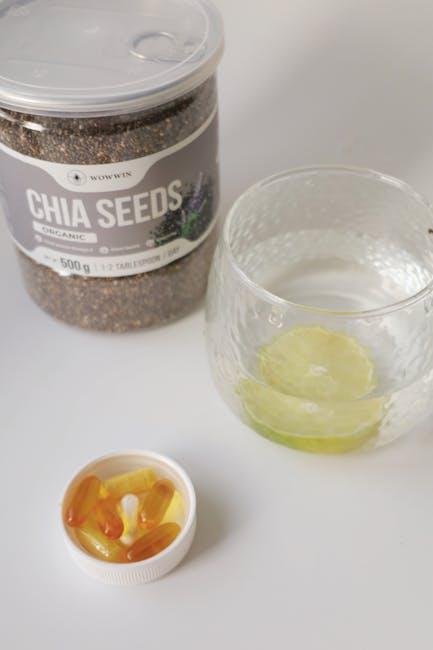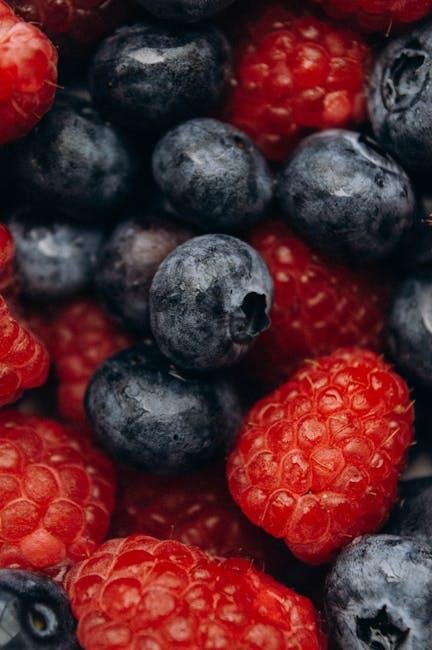In the quest for sharper focus, clearer memory, and overall mental vitality, the foods we choose can play a surprisingly powerful role. Beneath the vibrant colors and rich textures of nature’s bounty lie nutrients that nourish not just the body, but the brain itself. These “superfoods” are more than just trends on wellness menus—they are time-tested allies in supporting cognitive function and protecting neural health. In this article, we explore a variety of these remarkable foods, uncovering how they contribute to brain power and why incorporating them into your diet might be one of the smartest choices you make.
Table of Contents
- Superfoods Rich in Omega 3 Fatty Acids for Cognitive Boost
- Antioxidant Powerhouses That Combat Brain Aging
- Nutrient-Dense Berries Enhancing Memory and Focus
- Leafy Greens Packed with Essential Vitamins for Mental Clarity
- The Role of Nuts and Seeds in Supporting Neuroplasticity
- Incorporating Superfoods into Everyday Meals for Optimal Brain Health
- Q&A
- Future Outlook

Superfoods Rich in Omega 3 Fatty Acids for Cognitive Boost
Omega 3 fatty acids are essential nutrients that play a crucial role in enhancing brain function and protecting cognitive health. Incorporating these healthy fats into your diet can improve memory, sharpen focus, and even help stave off age-related cognitive decline. Foods like salmon, chia seeds, walnuts, and flaxseeds are excellent natural sources that fuel the brain with EPA and DHA—two powerful types of Omega 3 fatty acids known for reducing inflammation and promoting neural communication.
To give a visual snapshot of the nutrient richness:
| Superfood | Omega 3 Content (per 100g) | Brain Benefit |
|---|---|---|
| Salmon | 2260 mg | Enhances memory & concentration |
| Chia Seeds | 17800 mg | Boosts cognitive endurance |
| Walnuts | 2542 mg | Supports mood and neural growth |
| Flaxseeds | 22910 mg | Protects neurons from oxidative stress |
- Fatty Fish: Rich in both EPA and DHA, perfect for a weekly brain boost.
- Seeds & Nuts: Plant-based ALA that the body converts into critical Omega 3s.
- Supplements: A reliable fallback for those who prefer dietary variety or have allergies.

Antioxidant Powerhouses That Combat Brain Aging
Unlocking the secret to vibrant cognitive health often begins with harnessing the incredible benefits of antioxidants. These powerful compounds help neutralize harmful free radicals that can accelerate neural degeneration and cognitive decline. Foods rich in antioxidants, such as berries, dark leafy greens, and nuts, serve as natural shields for brain cells, protecting them from oxidative stress and inflammation. Incorporating these nutrient-dense superfoods into your diet can contribute to sharper memory, enhanced focus, and overall brain longevity.
Here are some of the standout antioxidant sources to include regularly for maximum brain protection:
- Blueberries: Packed with flavonoids that support neural communication.
- Spinach: Abundant in lutein and vitamin E, guarding brain cell integrity.
- Walnuts: Rich in polyphenols and omega-3 fatty acids for anti-inflammatory benefits.
- Dark Chocolate: Contains cacao flavonoids that boost cerebral blood flow.
| Antioxidant Superfood | Key Compound | Brain Benefit |
|---|---|---|
| Blueberries | Anthocyanins | Memory enhancement |
| Spinach | Lutein | Protection against cognitive decline |
| Walnuts | Polyphenols | Reduced brain inflammation |
| Dark Chocolate | Flavonoids | Enhanced cerebral blood flow |

Nutrient-Dense Berries Enhancing Memory and Focus
Berries stand out as vibrant powerhouses packed with antioxidants, vitamins, and flavonoids that work synergistically to sharpen mental clarity and improve cognitive functions. Incorporating a variety of these colorful fruits into your diet can help combat oxidative stress and inflammation, two key factors linked to cognitive decline. Blueberries, strawberries, and blackberries, in particular, have been shown to enhance memory retention and boost focus by stimulating neural pathways and promoting brain plasticity.
Beyond their impressive antioxidant content, berries offer a unique blend of phytonutrients that support brain health:
- Anthocyanins – these pigments improve communication between brain cells.
- Vitamin C – helps protect neurons from damage and supports neurotransmitter function.
- Fiber – aids digestive health, which indirectly benefits cognitive performance through the gut-brain axis.
| Berry | Key Brain Benefits | Ideal Serving |
|---|---|---|
| Blueberries | Memory enhancement, neuroprotection | 1 cup daily |
| Strawberries | Improved focus, reduced inflammation | ½ cup daily |
| Blackberries | Increased brain plasticity, antioxidant support | ½ cup daily |

Leafy Greens Packed with Essential Vitamins for Mental Clarity
Leafy greens like spinach, kale, and Swiss chard are nature’s own multivitamin for the brain, loaded with a host of essential nutrients that enhance cognitive function. Rich sources of vitamins A, C, and K, as well as folate and iron, these greens help combat oxidative stress and inflammation – two major culprits behind mental fog and cognitive decline. Incorporating these vegetables into your meals can promote sharper focus, better memory retention, and overall mental clarity.
To maximize the brain-boosting benefits, aim to include a variety of leafy greens in your diet daily. Beyond the obvious vitamins, their high fiber content supports a healthy gut-brain axis, improving neurotransmission and mood regulation. Below is a quick reference table showcasing key vitamins found in popular leafy greens:
| Leafy Green | Key Vitamins | Brain Benefits |
|---|---|---|
| Spinach | Vitamin K, Folate, Vitamin A | Memory support & cognitive preservation |
| Kale | Vitamin C, Vitamin K, Iron | Neuroprotection & reduces inflammation |
| Swiss Chard | Vitamin A, Vitamin C, Magnesium | Mental alertness & mood stabilization |
- Pro tip: Lightly steaming greens helps retain maximum nutrients while making them easier to digest.
- Pair with healthy fats like olive oil or avocado to boost absorption of fat-soluble vitamins.

The Role of Nuts and Seeds in Supporting Neuroplasticity
Incorporating nuts and seeds into your diet is a powerful strategy to boost neuroplasticity, the brain’s remarkable ability to adapt and reorganize itself. Rich in essential fatty acids like omega-3s, antioxidants, and vital minerals, these tiny nutritional powerhouses nourish brain cells and enhance synaptic connections. Walnuts, for instance, are packed with DHA, a type of omega-3 critical for maintaining cognitive function and promoting neuron regeneration. Likewise, flaxseeds and chia seeds deliver high doses of alpha-linolenic acid, a plant-based omega-3 that supports brain cell membrane fluidity and improves communication pathways.
Beyond healthy fats, nuts and seeds offer a bounty of compounds that help reduce inflammation and oxidative stress—two major inhibitors of neuroplasticity. Their rich stores of vitamin E, magnesium, and polyphenols create a neuroprotective environment, fostering memory retention and learning ability. Consider these nutrient highlights:
- Almonds: High in vitamin E, supporting cognitive health.
- Pumpkin seeds: Excellent magnesium source, aiding nerve signaling.
- Cashews: Rich in zinc, vital for brain cell communication.

Incorporating Superfoods into Everyday Meals for Optimal Brain Health
Integrating superfoods into your daily menu doesn’t have to be complicated or time-consuming. Simple swaps can amplify your brain’s vitality—start by adding a handful of walnuts or pumpkin seeds to your morning oatmeal or yogurt. These nuts provide essential omega-3 fatty acids and antioxidants that help sharpen memory and support cognitive function. Another easy trick is to blend a mix of spinach, blueberries, and flaxseeds into a smoothie for an antioxidant-packed beverage, perfect for fueling your brain mid-afternoon.
Beyond smoothies and snacks, consider enriching your main dishes with brain-boosting ingredients. Incorporate salmon or sardines in salads or dishes twice a week to benefit from their rich DHA content, vital for neuron communication. Vegetables like broccoli and kale can be effortlessly sautéed with garlic and olive oil to create a nutrient-rich side dish. Below is a quick reference table for easy ideas you can try throughout the week:
| Meal | Superfood | Brain Benefit |
|---|---|---|
| Breakfast | Walnuts | Improves memory & mood |
| Snack | Blueberries | Boosts antioxidant defense |
| Lunch | Spinach | Enhances cognitive flexibility |
| Dinner | Salmon | Supports neuron function |
Q&A
Q&A: Superfoods That Support Brain Health
Q1: What exactly are superfoods, and why are they important for brain health?
A: Superfoods are nutrient-dense foods that offer exceptional health benefits. When it comes to brain health, these foods provide essential vitamins, antioxidants, and healthy fats that support memory, focus, and cognitive function. They help protect brain cells from damage and promote neural growth, keeping your mind sharp over time.
Q2: Can you name some top superfoods known for enhancing brain function?
A: Absolutely! Some of the top brain-boosting superfoods include blueberries, rich in antioxidants; fatty fish like salmon, packed with omega-3 fatty acids; walnuts, a great source of healthy fats; dark leafy greens such as spinach or kale, loaded with brain-friendly nutrients; and turmeric, which contains curcumin, a powerful anti-inflammatory compound.
Q3: How do antioxidants in superfoods benefit the brain?
A: Antioxidants fight oxidative stress caused by free radicals, which can damage brain cells over time. By neutralizing these harmful molecules, antioxidants help reduce inflammation and slow cognitive decline, potentially lowering the risk of neurodegenerative diseases like Alzheimer’s.
Q4: Is it better to eat superfoods individually, or should they be combined in meals?
A: While each superfood has unique benefits, combining them in meals can create a synergistic effect, enhancing overall brain nourishment. For example, a salad combining leafy greens, walnuts, and blueberries offers a diverse mix of nutrients that work together to support various aspects of brain health.
Q5: How quickly can someone expect to notice improvements in brain function after adding superfoods to their diet?
A: The timeline can vary from person to person. Some might feel sharper focus or better memory within a few weeks, while for others, the benefits may become more apparent over months of consistent healthy eating. It’s important to view superfoods as part of a long-term lifestyle approach rather than quick fixes.
Q6: Are there any superfoods that people should be cautious about regarding brain health?
A: Generally, superfoods are safe when consumed in normal dietary amounts. However, some, like excessive caffeine from green tea or dark chocolate, can cause jitteriness or interfere with sleep if overconsumed. It’s best to maintain balance and consult a healthcare professional if you have specific health conditions.
Q7: Beyond diet, what other habits support brain health alongside eating superfoods?
A: Nutrition is just one piece of the puzzle. Regular physical exercise, adequate sleep, mental stimulation (like puzzles or learning new skills), stress management, and social engagement all play vital roles in maintaining and enhancing brain function throughout life.
This Q&A illuminates the fascinating link between what we eat and how well our brains perform, making the pursuit of cognitive vitality as delicious as it is wise.
Future Outlook
As the pages of nature’s pantry continue to reveal their secrets, it becomes clear that nourishing our minds is just as vital as fueling our bodies. Incorporating these superfoods into your daily routine offers more than just flavor—it’s a mindful step toward sustaining the vibrant, agile thinking we all strive for. While no single ingredient holds the key to perfect brain health, a colorful, balanced diet filled with these nutritional powerhouses can become your brain’s trusted ally in the journey toward clarity, focus, and lasting mental vitality. After all, the strongest minds often stem from the simplest, most thoughtful choices on our plates.















Leave feedback about this